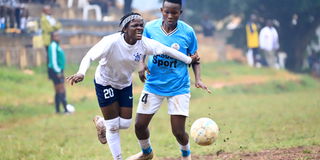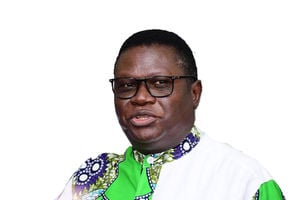Prime
Women’s teams: A path to development or marriage of convenience?

Kampala Queens Zaina Nandede (in white) protects the ball from Asubo's Alima Nambafu. PHOTOS/JOHN BATANUDDE
What you need to know:
It remains unclear whether the clubs that have started partnerships with women’s football teams are the good people or the bad ones in the development of women's football. Are they genuinely committed to development or merely circumventing regulations?
Renowned Greek philosopher Plato once said that “Good people do not need laws to act responsibly and bad people will find a way around those laws.”
It remains unclear whether the clubs that have started partnerships with women’s football teams are the good people or the bad ones in the development of women's football. Are they genuinely committed to development or merely circumventing regulations?
What is certain, however, is that the women's game needs to be developed in whatever ways possible.
To achieve this, Fifa and Caf through the federations and associations like Fufa have established regulations to help elevate women’s football alongside the men’s version, which has existed for decades, if not a century.
Prerequisite
The new Caf directives require clubs that participate in their interclub continental competitions require a men’s club to own a women’s side or at least have a connection to one.
According to the licensing rules, “the licence applicant must have at minimum one women’s first team participating in a competition sanctioned by the Licensor.”
To comply, a club must either “operate the women’s team itself or have a written agreement with another entity who operates the team”.
In the latter case, the club is obliged to provide support related to technical, financial, infrastructure, and other areas.
The team must be playing in official competitions organized by its federations.
“The value of women's football has been consistently demonstrated, making it essential for Caf to work with all relevant stakeholders in implementing strategies to take women's football in Africa to its highest level,’’ Raul Chipenda, Caf's director of technical development, said in 2022 during the launch.
He added, “Caf's successful initiatives in elevating the women's game have been a global inspiration, ensuring continuous growth and success for women's football on the continent. We are proud as confederation to fully adopt this mandatory club licensing requirement moving forward.”
The Caf directive came into effect in July 2022, coinciding with last season’s continental championships.

Lady Doves former player Reticia Nabbosa.
Fufa has inferred this rule and starting this season, it will be a licensing requirement for clubs. Although this requirement is classified under ‘best practices’ and not mandatory, it will eventually follow Caf’s path. This requirement contributes to about 30 out of a maximum 345 points for the sporting criteria.
Key questions for clubs owning a women’s team will be whether the two train at the same venue, if they play matches on the same pitch, if they provide technical support to the women’s and if they use the same branding.
For clubs associating with a women’s team, questions to consider include their financial investments, nature of investment (whether in-kind or otherwise) and timeline to fully own a women’s side if it’s part of their objectives.
The ultimate goal, as mentioned earlier, is for men’s clubs to own a ladies' team!
Balancing corporate responsibility
URA is the latest club to join the club, mainly for their own corporate reasons. The Tax Collectors recently signed a partnership pact with record women’s champions Kawempe Muslim to take over their junior side. For a start, the new team will be called URA-Kawempe WFC. URA itself started as URA-Lyantonde years ago… not bad for a memory.
Their chief executive officer Allan Munaaba said the formation of a club was in line with their gender-equity strategy, accelerated by the need to fulfill the prerequisites this season.
“This is something that we have been planning through the years because we didn’t want to look like a sexist club but needed to balance the genders. This is a CSR activity for URA so we are extending a helping hand to the girl-child,” Munaaba explained during the launch in July.
The team will be called URA-Kawempe in the initial years and then rebranded to URA Women’s team.
Full support
Similarly to URA, Bul picked regional league side Jinja City Queen for the same purpose.
“It’s not entirely for Fufa and Caf because that is easier to fulfil but we’re taking on Jinja City Queens. We want to build a big project that we will finance and support in technical, media and all fronts like our own for the long run,” Eng. Ronald Barente, the chairman Bul says.
He emphasized the club has the capacity to run its own branded team but picked Jinja City due to its community focus and local appeal
Maroons, Express and UPDF are some of the clubs that have started their own women’s teams from scratch.
In-kind
KCCA’s partnership with Kampala Queens owned by Fufa president Eng. Moses Magogo is slightly different. Kampala Queens seems to be doing well financially. Their main challenge was a quality ground that befits their name as well as establishing a strong corporate presence, which Lugogo provides.
“One of the biggest benefits [from the KCCA partnership] is that we’re using a better facility and have a corporate relationship with KCCA and their partners,” Meddie Ssengendo, the Kampala Queens’ chief executive officer explained.
Kampala Queens use the MTN Omondi Stadium in Lugogo for their matches at no extra cost.
“This partnership,” Ssengendo continues, “has unlocked opportunities and we’ll be unveiling a corporate sponsor soon. That’s what we needed from such a partnership based on the club’s needs.”
During the unveiling, KCCA was very distinct about the partnership. That it was purposely “for all official engagements including Fufa, Caf and Fifa Competitions” while stressing that, “Kampala Queens will retain its brand identity”. Vipers shares a similar relationship with Wakiso Hill WFC.

Joao Gabriel Cardoso (C) being pursued by Kitara defender Jasper Aheebwa in a league game.
Burden of compliance
Most privately owned clubs feel this is a burden to their already burgeoning expenses.
“Running a women’s club is nearly as costly as running a men’s club, effectively doubling our expenses. Simply attaching a women’s team to a struggling club isn’t practical; junior teams can feed the club but women’s teams operate in parallel,” said a club owner who wished to remain anonymous due to the sensitive nature of the topic.
Mercy Munduru, a director at Onduparaka shares the same views: “The clubs are already burdened with the existing requirements like the youth wing and now this.
“It’s a good idea but these rules should be backed by resources and time to allow for transition, otherwise compliance will become a mere formality and won’t make much sense or will eventually run down the existing structures of clubs.”
Implementation challenges
Fufa director of football development Ali Mwebe says the federation, under their Technical Master Plan (TMP), is mapping a path to implement this effectively.
“I may not give you details now but the protocol is under the Fufa TMP. We’re building all what will be required but for now, club licensing requires only an MoU,” he said.
This move by the Caf and Fufa marks a significant step towards promoting gender equality and enhancing the development of women’s football in the country. Whereas the potential benefits are substantial, the directive also poses several challenges that need to be addressed for successful implementation.
Caf president was previously quoted saying, “By addressing these challenges and leveraging the opportunities, African football can move towards a more inclusive and prosperous future for both men and women."
UPL teams with their female counterparts (So far)
BUL-Jinja City Queens
URA-Kawempe Muslim Junior team
Vipers-Wakiso Hills
Express-Express WFC
SC Villa-Kampala Junior Team Ladies
Kitara-Lady Doves
KCCA-Kampala Queens FC
Maroons-She Maroons
Police-Police WFC
UPDF-UPDF WFC




